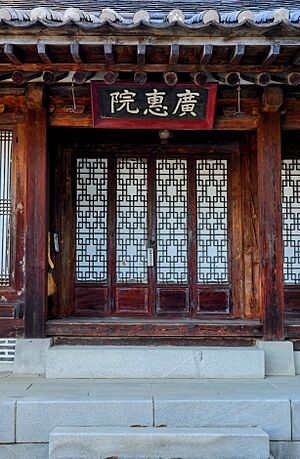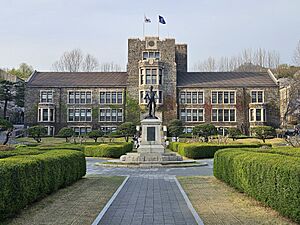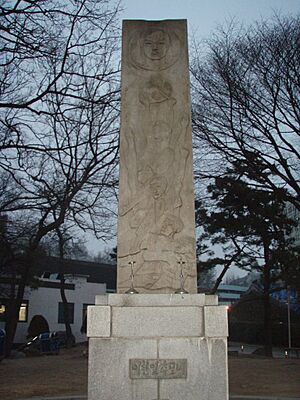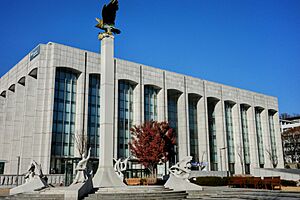Yonsei University facts for kids
|
연세대학교
|
|
 |
|
| Motto | (Latin) "Cognoscetis Veritatem et Veritas Liberabit Vos" (John 8:32) (English) "The truth will set you free" (John 8:32) 진리가 너희를 자유케 하리라. (요한복음 8:32) |
|---|---|
| Type | Private |
| Established | 1885 |
|
Academic affiliation
|
AALAU, ACUCA, AEARU, APRU |
| President | Dong-Sup Yoon |
|
Academic staff
|
1,712 (2022) |
|
Administrative staff
|
1,166 (2022) |
| Students | 29,832 (2022) |
| Undergraduates | 18,200 (2022) |
| Postgraduates | 11,632 (2022) |
| Location |
,
South Korea
|
| Campus | Urban |
| Colours | Royal blue |
|
Sporting affiliations
|
U-League |
| Mascot | Eagle |
| Korean name | |
| Hangul |
연세대학교
|
| Hanja |
延世大學校
|
| Revised Romanization | Yeonse Daehakgyo |
| McCune–Reischauer | Yŏnse Taehakkyo |
Yonsei University (Korean: 연세대학교; Hanja: 延世大學校) is a private Christian research university in Seoul, South Korea. It is one of the three most famous universities in the country. These are often called SKY universities.
The university started in April 1885 as Gwanghyewon. This was Korea's first modern medical center. Today, it is part of Severance Union Medical College. The university as we know it was formed in January 1957. This happened when Yonhi College and Severance merged. The name "Yonsei" comes from parts of their old names. "Yon" is from Yonhi College, and "Sei" is from Severance Union Medical College. Yonhi College began in March 1915 as Chosun Christian College. These two schools were the first of their kind in Korea.
Yonsei University has many students. In 2022, there were 18,200 undergraduate students and 11,632 graduate students. The university also has many teachers and staff. Yonsei has its main campus in Seoul. It offers many different study programs. Famous people who went to Yonsei include a Nobel laureate, an Academy Award winner, and Olympians.
Contents
University History
Early Years (1885–1916)
Yonsei University's medical school began on April 10, 1885. This was when Gwanghyewon opened. It was the first modern hospital in Korea to use Western medicine. Horace Newton Allen, an American Protestant missionary, started the hospital. It was later renamed Chejungwon.
In 1893, Canadian Oliver R. Avison took over running Chejungwon. At first, the Korean government helped pay for it. But after 1894, the church took full control. In 1899, Avison met Louis Severance, a kind businessman. Severance helped pay for new hospital buildings. Because of his help, Chejungwon was renamed Severance Hospital.
Severance Hospital was mainly for treating people. But it also taught medical students. In 1886, it welcomed its first 16 medical students. By 1899, Chejungwon Medical School was a recognized school. In 1913, it became Severance Union Medical College.
The other part of Yonsei University started on March 5, 1915. This was Chosun Christian College, founded by Horace Grant Underwood. He was an American Protestant missionary. Underwood became the first president. Classes began in April with 81 students. Underwood passed away in 1916. Avison then became the president.
During Japanese Rule (1916–1945)
In 1910, Japan took control of Korea. The Japanese government made strict rules for schools. They wanted to control private education in Korea. Schools had to get permission for everything. All classes also had to be in Japanese.
Severance Union College worked hard to follow these rules. It became a recognized medical school in 1917. In 1923, Severance got back its right to give medical licenses. This meant its graduates did not need a state exam. By 1934, its graduates could practice medicine anywhere in Japan. Oh Geung Seon became the first Korean president of Severance in 1934.
Chosun Christian College also faced challenges. It was renamed Yonhi College. It was only recognized as a "professional school" in 1917. This was because Japanese rules did not allow Korean private colleges. Yonhi had departments for humanities, agriculture, commerce, and more. The rules also tried to stop teaching Korean history or the Bible.
After the March First Independence Movement in 1919, Japan became a bit less strict. Yonhi was recognized as a professional school like those in Japan. It was also allowed to teach Christian programs and the Bible. However, Japanese literature became a required subject. Korean history was taught as "Eastern History."
In the late 1930s, Japan became stricter again. They wanted Koreans to become more like Japanese. They forced Koreans to change their names and follow Shinto religion. Schools were told to stop teaching Korean language. In 1938, Yonhi was forced to teach Japanese studies. English classes also faced pressure. American and British teachers were removed in 1941. The government took control of the school in 1942.
Korean War and After (1946–1959)
After Korea was freed, Severance became a college in 1947. Many medical staff left to help other hospitals. When the Korean War started in 1950, Severance became a field hospital. It had to move several times to stay safe. The Severance building in Seoul was badly damaged. Severance Hospital returned to Seoul in April 1952.
Yonhi University reopened on January 21, 1946. It was recognized as a university on August 15, 1946. Plans to combine Yonhi and Severance began in December 1948. The Graduate School started in July 1950.
The Korean War stopped everything in June 1950. The North Korean military used the Yonhi campus as their base. This caused a lot of damage when the US military took Seoul back. Yonhi also had to move to Busan. It returned to its campus in Seoul in the fall of 1953.
Finally, in 1957, Severance Medical College and Hospital joined with Yonhi University. This created Yonsei University.
Academics
University Reputation
| JoongAng National | Domestic | 2 | |
|---|---|---|---|
| QS National | General | 2 | |
| THE National | General | =3 | |
| USNWR National | General | 2 | |
| ARWU National | Research | 3–6 | |
| QS Asia (Asia version) |
General | 9 | |
| THE Asia (Asia version) |
General | =19 | |
| USNWR Asia | General | 42 | |
| ARWU World | Research | 201–300 | |
| QS World | General | 50 | |
| THE World | General | =102 | |
| USNWR World | General | =180 | |
Yonsei is one of Korea's three "SKY" universities. These are the most famous and respected universities in the country. The other two are Seoul National University and Korea University. Getting into a "SKY" university is very hard. The acceptance rate for early admission at Yonsei University is less than 1%. To apply for regular admission, students need very high test scores.
In Korea, getting into a SKY university is often seen as a big step. It can help shape a person's future career and social standing.
Global Rankings
Yonsei University is highly ranked around the world. In 2025, it was ranked 56th in the QS World University Rankings. It was also ranked 1st among private universities in Asia in 2024. In 2023, Yonsei was 78th in the THE World University Rankings. It was also 1st among private universities in Asia in these rankings.
Yonsei is known for its strong programs. In THE World University Rankings by Subjects, Yonsei was 1st among Korean universities in four subjects. These include Business & Economics, Social Sciences, Clinical & Health, and Psychology. Yonsei University is recognized as one of the top universities in Asia.
Colleges and Programs
Undergraduate Programs
- College of Liberal Arts
- College of Commerce and Economics
- School of Business
- College of Science
- College of Engineering
- College of Life Science and Biotechnology
- College of Computing
- College of Theology
- College of Social Sciences
- College of Music
- College of Human Ecology
- College of Science in Education
- University College
- Underwood International College
- College of Medicine
- College of Dentistry
- College of Nursing
- College of Pharmacy
- Global Leaders College
Postgraduate Programs
- Graduate School (Sinchon/International Campuses)
- United Graduate School of Theology
- Graduate School of International Studies
- Graduate School of Information
- Graduate School of Communication and Arts
- Graduate School of Social Welfare
- Graduate School of Business Administration
- Graduate School of Education
- Graduate School of Public Administration
- Graduate School of Engineering
- Graduate School of Journalism and Mass Communication
- Graduate School of Law
- Graduate School of Human Environmental Sciences
- Graduate School of Economics
- Law School
- Graduate School of Health and Environment
Severance Hospital Divisions
- Severance Hospital (Sinchon)
- Gangnam Severance Hospital
- Yongin Severance Hospital
- Songdo Severance Hospital (under construction as of 2024)
International Programs
- Yonsei International Summer School (YISS)
YISS runs from late June to early August. It started in 1985 and now has over 2,000 students. These students come from more than 30 countries.
- Winter Abroad at Yonsei (WAY)
WAY is a newer program, started in 2013. It is a 3-week program. It runs from late December to early January.
- Study Abroad at Yonsei
Yonsei University offers programs for students who want to study in Korea. Students can come for a year or a semester.
University Culture
Symbols of Yonsei
The university's symbol uses the Korean letters "ㅇ" and "ㅅ" from "연세" (Yonsei). The circle "ㅇ" means a complete and well-rounded person. The "ㅅ" shows the goal of reaching for excellent knowledge. The "ㅇ" also stands for Heaven, the line for Earth, and "ㅅ" for people.
The open book means truth. The torchlight means freedom. The whole symbol protects these two main ideas of the university. The university's mascot is an eagle. Its main color is "royal blue."
Christian Foundation
Yonsei University was built on Christian ideas. Its goal is to create Christian leaders who believe in freedom and truth. Its history shows this, as American Protestant missionaries founded it. The university's motto, "The truth will set you free" (John 8:32), comes from the Bible.
The university's board of directors includes members from four Korean Christian groups. These are the Presbyterian Church of Korea, the Presbyterian Church in the Republic of Korea, the Korean Methodist Church, and the Anglican Church of Korea. In Korea, schools started by Christian groups are often called mission schools.
Students do not have to be active Christians to get into Yonsei University. However, undergraduate students are required to attend a weekly chapel service for four semesters to graduate.
Student Life
Yonsei offers many scholarships for international students. These scholarships can cover tuition and housing costs.
Akaraka is the official college festival for Yonsei students. It usually happens in May. Many famous singers and celebrities perform at this festival.
Student Clubs
Yonsei University has over 100 student clubs. Here are a few examples:
- AFKN Listener's Club (ALC) is a large club for Korean and international students. They play dramas and do activities with foreign students.
- Avenante is the only mixed choir at Yonsei. It has students from music and other majors. They perform concerts twice a year.
- CogSci:In is a club that studies cognitive science. They explore topics related to how the mind works.
- International Yonsei Community (IYC) helps students from different cultures connect. It was founded in 1995.
- Junior Scholar Club (JSC) helps students prepare for academic and research careers. It started in 1999.
- The Yonsei Annals is the university's official English newspaper. It started in 1962. Students write and edit the monthly magazine.
- Yonsei Financial Leaders (YFL) is one of the oldest finance clubs. It focuses on different areas of finance. Many alumni work in finance jobs.
- Yonsei European Studies (YES) publishes a journal about European and international affairs. It is the only bilingual undergraduate journal in South Korea.
Athletics
Yonsei University is part of the Korea University Sports Federation (KUSF). Its teams are called the "Eagles." They play in the KUSF U-League for sports like football, basketball, baseball, and ice hockey.
Rivalry with Korea University
Yonsei University and Korea University have a long-standing sports rivalry. Both schools claim to be the best private university in South Korea. They have famous annual sports matches. When Korea University hosts, it's called KoYon Jeon. When Yonsei University hosts, it's called YonKo Jeon.
These annual matches include soccer, baseball, basketball, rugby, and ice hockey. Many students, celebrities, and athletes come to watch. Before the YonKo Jeon, students from both universities gather. They practice cheers and show their school spirit.
Yonsei has a good record in these games. In 2017, Yonsei University won all five games. In 2018, Yonsei won three games. The 2020 matches were canceled due to the COVID-19 outbreak.
Campuses
Yonsei University has two main campuses. These are the Sinchon Campus in Seoul and the International Campus in Songdo, Incheon. Since 2011, most new students live at the International Campus for a year. They complete special programs there. After that, they move to the Sinchon campus in Seoul.
Sinchon Campus
Yonsei's Sinchon Campus is about 250 acres. It is located about 6 kilometers west of central Seoul. This campus has most of the university's academic departments. It has a mix of old, historic buildings and new, high-tech ones.
Yonsei International Campus (Songdo, Incheon)
The Yonsei International Campus is in Songdo, Incheon. It is a key part of the Songdo International Business District. The first part of the campus was finished in 2010. More expansion began in 2011.
Most new students live here for one year. They complete their Residential College (RC) program. This campus also offers many other programs. These include undergraduate and graduate studies.
The dormitory at the International Campus has 12 houses. Each house is named after an important person or place in Yonsei's history. For example, Underwood House is named after the university's founder. Yun, Dong-Joo House is named after a famous poet.
Notable Alumni
Business Leaders
- Koo Bon-moo: Former Chairman of LG Group
- Kim Woo-jung: Founder and CEO of Daewoo Group
- Baek Jong-won: CEO of The Born Group
- Suh Kyung-bae: Chairman of TaePyongyang Corporation
- Lee Boo-jin: President and chief executive of Hotel Shilla (Samsung Group)
Writers and Artists
- Han Kang: Novelist, won the 2024 Nobel Prize in Literature
- Yun Dong-ju: Poet and Korean independence movement activist
- Bong Joon-ho: Academy-award-winning director
- Kim Dong-ryool: Singer-songwriter
- Park Jin-young: Singer, actor, producer, founder of JYP Entertainment
- Luhan: Actor, singer
Public Service and Academics
- Han Seung-soo: Former Prime Minister of South Korea
- Kang Kyung-wha: Foreign Minister of South Korea
- Jeong Han Kim: Mathematician, won the 1997 Fulkerson Prize
- Marvin Chun: Dean of Yale College
Sports Stars
- Lee Sung-gu: "Father of Korean basketball," Olympian
- Huh Jung-moo: Former soccer player and coach
- Jiyai Shin: Professional Golfer
- Chun Lee-kyung: Four-time Olympic Gold Medalist in Short Track Skating
- Ryu So-yeon: Professional golfer, won 2011 U.S. Women's Open
- Son Yeon-jae: First Korean rhythmic gymnast to win gold in the World Cup series
- Choi Min-jeong: South Korean short track speed skater, won gold at PyeongChang 2018 Olympics
- Kim Min-jae: Soccer Defender for Bayern Munich
- Hwang Ui-jo: Footballer for Norwich City
Images for kids
See also
 In Spanish: Universidad Yonsei para niños
In Spanish: Universidad Yonsei para niños
 | Georgia Louise Harris Brown |
 | Julian Abele |
 | Norma Merrick Sklarek |
 | William Sidney Pittman |






